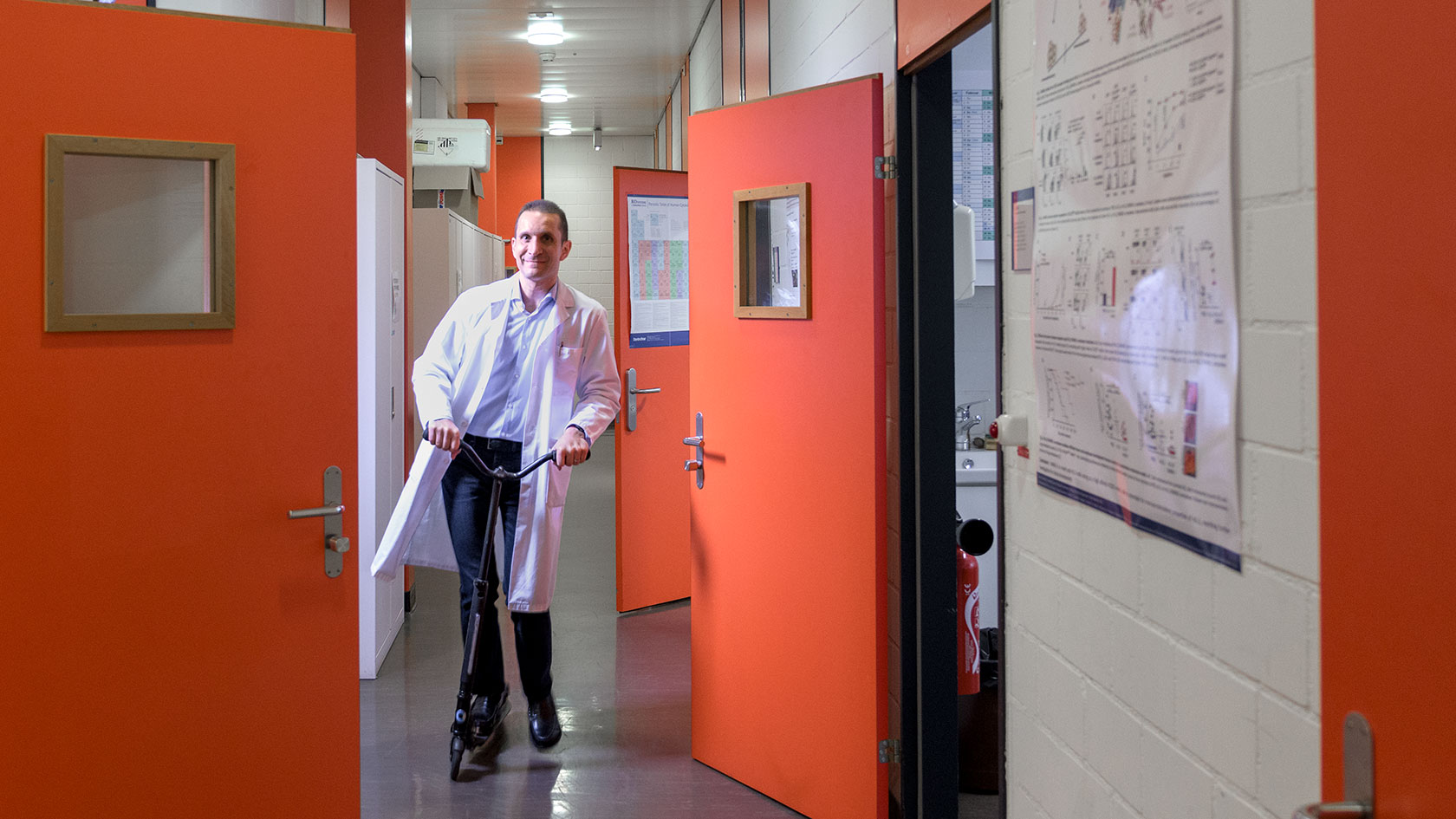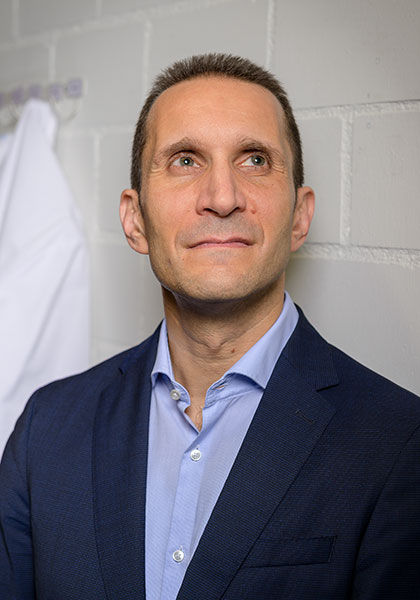Navigation auf uzh.ch
Navigation auf uzh.ch

Last February, Onur Boyman received thousands of emails in just a few days. While a full inbox is nothing unusual for him – the 49-year-old is both a medical professor at UZH and head of clinic at University Hospital Zurich – this volume of messages in such a short space of time was unprecedented. “It was on a whole new level,” he recalls during our visit to his lab in Zurich.
The emails had come not only from fellow researchers and industry representatives, but also from numerous patients. Understandably so, since the results achieved by Boyman and his research team had not only made it into the prestigious journal Science, but also onto the main news on Swiss television, the American news channel NBC and countless other media outlets across the world.
So what’s the story? Earlier in the year, Boyman and his researchers had made a groundbreaking discovery in their studies on long Covid. They were the first scientists ever to identify a biomarker – a measurable change in the body – linked to the disease. Using comprehensive blood analyses, they found that there was a part of the immune system in long Covid patients that remained active even after the virus had been fought off.
The part in question was the complement system, which normally fights infections by destroying infected body cells – and then switches off once its job is done. In long Covid patients, however, the researchers found that the system simply kept going, causing damage to healthy cells and organs in the process. The result? Symptoms like exhaustion, fatigue, listlessness, weakness and shortness of breath – all the hallmark symptoms of long Covid – which led the team to conclude that the disease may essentially be an immune disorder. In an ideal world, their discovery could pave the way for the development of diagnostic tests and treatments; however, getting to this point may take years, given the millions that pharmaceutical companies would need to invest in creating a simplified blood test and effective medication. Despite the long timeline, many of the emails Boyman received were notes of thanks. After all, for many long Covid patients, simply having their condition recognized was almost as important as the hope of a cure. As Boyman says: “Our study definitively disproves the notion that long Covid is all in people’s heads.”

Our study definitively disproves the notion that long Covid is all in people’s heads.
On this summer’s day, Boyman is wearing a white shirt with the top button undone. He’s the type of doctor you’d be happy to trust with your health – calm, serious and genuinely interested, yet distant enough to assure you that everything will remain confidential. He has an air of professional friendliness, answers questions with an initial “sure” and, at one point during the interview, suddenly proffers a bowl of sweets. "Please. A little treat to keep you going."
Born in Lausanne to an engineer father and an accountant mother, Boyman’s family moved to the canton of Zurich before he started school. He completed his medical degree at UZH, and was struck by the joined-up thinking the subject required. He demonstrates what he means by pulling the bowl of sweets towards him and placing a Raffaello, an Amaretto, and two Tartufos, one black and one white, on the table in front of him. “Imagine a patient comes to me with these four different symptoms. As a doctor, I need to work out how they’re all connected – even if I don’t yet know the cause.” He offers a simple example: if a patient presents with shortness of breath, exhaustion and a cough during a COVID-19 wave, a viral infection is a reasonable assumption.
The fact that Boyman moved into research after his degree arose from his desire to understand more about what causes diseases. “In research, it’s the other way round – we study causes without knowing the practical value of our findings.” Today, Boyman wears two hats: one as a doctor and Director of the Department of Immunology at USZ who treats patients with complex immune disorders; another as a professor at UZH where he runs his own research lab, the Boyman Lab. "Research and clinical practice are like two different languages. At the Boyman Lab, we’re bilingual" he says.
Research and clinical practice are like two different languages. At the Boyman Lab, we’re bilingual.
His journey into immunology began with his research on psoriasis. So surprised was he to learn that the body’s own immune system was responsible for this skin inflammation, that he flew to San Diego (USA) to pursue further research on the subject, vowing not to return until he’d fully understood the immunological mechanisms involved. He spent three years at the prestigious Scripps Research Institute in La Jolla before returning to Switzerland, first to Lausanne and then to Zurich.
Boyman puts the sweets back in the bowl, saving the black Tartufo for later. When asked how long his working days are with two jobs he says: “I don't count my hours. But I imagine that at both places people think I work full time.” And then he casually mentions that, after 11 years, he’ll be stepping down as head of clinic at USZ at the end of the year. Now 49, he’s still full of energy and Boyman the doctor has decided to become an entrepreneur, too. “We’ve really found something special,” he says.
Boyman gets up from his desk and takes down a small crystal amulet hanging on the wall. It was given to him by a patient who’d flown in from Brazil for treatment. “She’d first asked for our shoe sizes,” he recalls. “Footwear of some kind must be a common gift in her home country.” Because he’d declined, the woman had brought him the amulet instead. Her gratitude came in part because the innovative therapy was free, having formed part of a clinical trial.
It’s the results of this clinical trial – demonstrating that a pioneering new form of treatment for autoimmune diseases can work – that lie behind Boyman’s venture into the private sector. But what’s the therapy based on? In diseases such as multiple sclerosis, type 1 diabetes or lupus, inflammation is caused by the body's immune system overreacting. Until now, these conditions have been treated with immunosuppressants like cortisone – which suppress the entire immune system, including healthy cells, resulting in severe side effects and long-term damage to the body.
The new approach is designed to restore balance to the immune system and prevent these side effects. This is achieved using a protein called TREX that stimulates only those specific cells able to regulate the body’s immune system. Now hoping to bring the therapy to market, Boyman and colleagues Ufuk Karakus, Valerie Scholtes and Miro Räber have founded UZH spin-off Seito Biologics. However, as always in medicine, it will likely be years before the therapy becomes available to patients.
Doctor, researcher and now entrepreneur: “My driving force has always been to understand and help,” Boyman says as we near the end of our conversation. In terms of understanding, he’s consistently learning through his research, and hopes to continue his work at UZH even as an entrepreneur. But when it comes to helping, his ability has been somewhat restricted by all his other duties as head of clinic. This will change if his plans for the new immunotherapy are successful.
It’s been eight months since thousands of emails flooded Onur Boyman's inbox. “I’m still working through them,” he says in his trademark casual manner. Does he really intend to respond to every message? “That’s my goal. After all, these people took the trouble to write to me.”